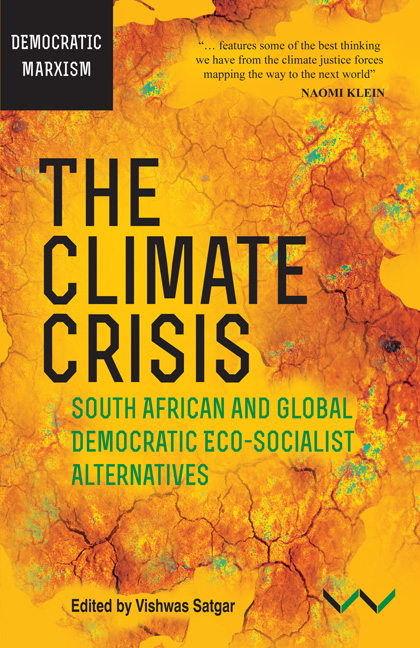Book contents
- Frontmatter
- Contents
- Tables and Box
- Acknowledgements
- Acronyms and Abbreviations
- Chapter 1 The Climate Crisis and Systemic Alternatives
- PART ONE THE CLIMATE CRISIS AS CAPITALIST CRISIS
- PART TWO DEMOCRATIC ECO-SOCIALIST ALTERNATIVES IN THE WORLD
- Chapter 4 The Employment Crisis, Just Transition and the Universal Basic Income Grant
- Chapter 5 The Rights of Mother Earth
- Chapter 6 Buen Vivir: An Alternative Perspective from the Peoples of the Global South to the Crisis of Capitalist Modernity
- Chapter 7 Challenging the Growth Paradigm: Marx, Buddha and the Pursuit of ‘Happiness’
- Chapter 8 Ubuntu and the Struggle for an African Eco-Socialist Alternative
- Chapter 9 The Climate Crisis and the Struggle for African Food Sovereignty
- PART THREE DEMOCRATIC ECO-SOCIALIST ALTERNATIVES IN SOUTH AFRICA
- CONCLUSION
- Contributors
- Index
Chapter 4 - The Employment Crisis, Just Transition and the Universal Basic Income Grant
from PART TWO - DEMOCRATIC ECO-SOCIALIST ALTERNATIVES IN THE WORLD
Published online by Cambridge University Press: 05 June 2019
- Frontmatter
- Contents
- Tables and Box
- Acknowledgements
- Acronyms and Abbreviations
- Chapter 1 The Climate Crisis and Systemic Alternatives
- PART ONE THE CLIMATE CRISIS AS CAPITALIST CRISIS
- PART TWO DEMOCRATIC ECO-SOCIALIST ALTERNATIVES IN THE WORLD
- Chapter 4 The Employment Crisis, Just Transition and the Universal Basic Income Grant
- Chapter 5 The Rights of Mother Earth
- Chapter 6 Buen Vivir: An Alternative Perspective from the Peoples of the Global South to the Crisis of Capitalist Modernity
- Chapter 7 Challenging the Growth Paradigm: Marx, Buddha and the Pursuit of ‘Happiness’
- Chapter 8 Ubuntu and the Struggle for an African Eco-Socialist Alternative
- Chapter 9 The Climate Crisis and the Struggle for African Food Sovereignty
- PART THREE DEMOCRATIC ECO-SOCIALIST ALTERNATIVES IN SOUTH AFRICA
- CONCLUSION
- Contributors
- Index
Summary
Since the nineteenth century, job creation has functioned as the primary – and in many cases the sole – strategy for improving people's well-being and life prospects. Such an approach is unsuited to current realities of tightly rationed and poorly remunerated waged work, a state of affairs that is predicted to endure. The scope and intensity of this crisis of waged work is likely to increase as digital and other job-replacing technologies are introduced more widely and as the dividend-boosting pressures of financialised capitalism persist. Given such an outlook, a universal basic income grant (UBIG) holds great appeal.
This chapter surveys the background to the current crisis before examining, in the context of a ‘just transition’, the advantages of a UBIG, the arguments against and its possible pitfalls. It concludes by showing that a UBIG, rare among redistributive interventions, holds great transformative potential and challenges core tenets of capitalist ideology. That potential can only be realised if a UBIG is treated not as a passive, technical intervention but as an aspect of a broader programme of societal transformation.
THE STATE OF THINGS
Chronic high unemployment, new jobs that are mostly at the low-pay end of the scale and that lack benefits and security, stagnating or declining real incomes, social protection systems that are either absent or tightly rationed, widening income inequality – those are descriptions that used to apply almost exclusively to countries on the margins of the global economy. Today, those features are increasingly generic. Jan Breman's (2013: 131) summary of trends in ‘developed’ economies is bracing and accurate:
With every recession since the 1970s, prolonged episodes of high unemployment, privatisations and public-sector cutbacks have served to weaken the position of labour in North America, Europe and Japan; trade-union movements were hollowed out by the shrinkage of the industrial workforce, through factory re-location or robotisation, and the growth of the non-unionised service and retail sectors; the rise of China, the entry of hundreds of millions of low-paid workers into the world workforce and the globalisation of trade helped to depress wages and working conditions further. Part-time and short-contract work has been on the rise, along with that ambiguous category, self-employment.
- Type
- Chapter
- Information
- Climate Crisis, TheSouth African and Global Democratic Eco-Socialist Alternatives, pp. 70 - 106Publisher: Wits University PressPrint publication year: 2018



